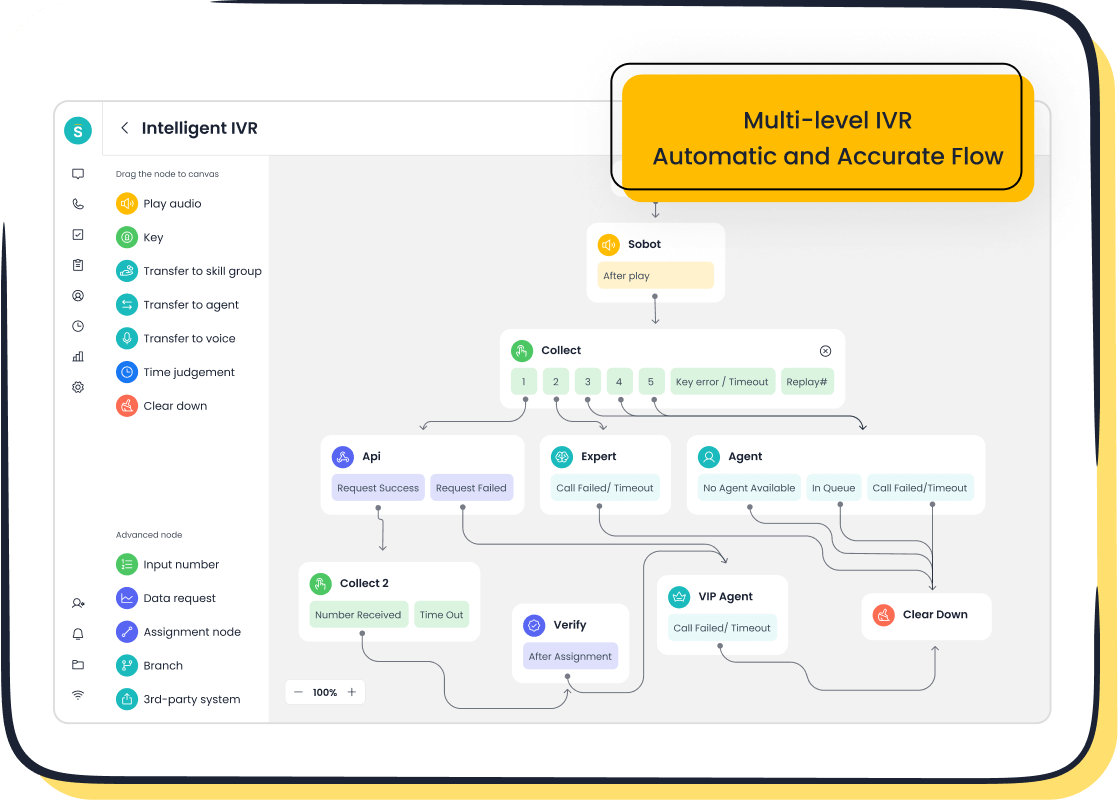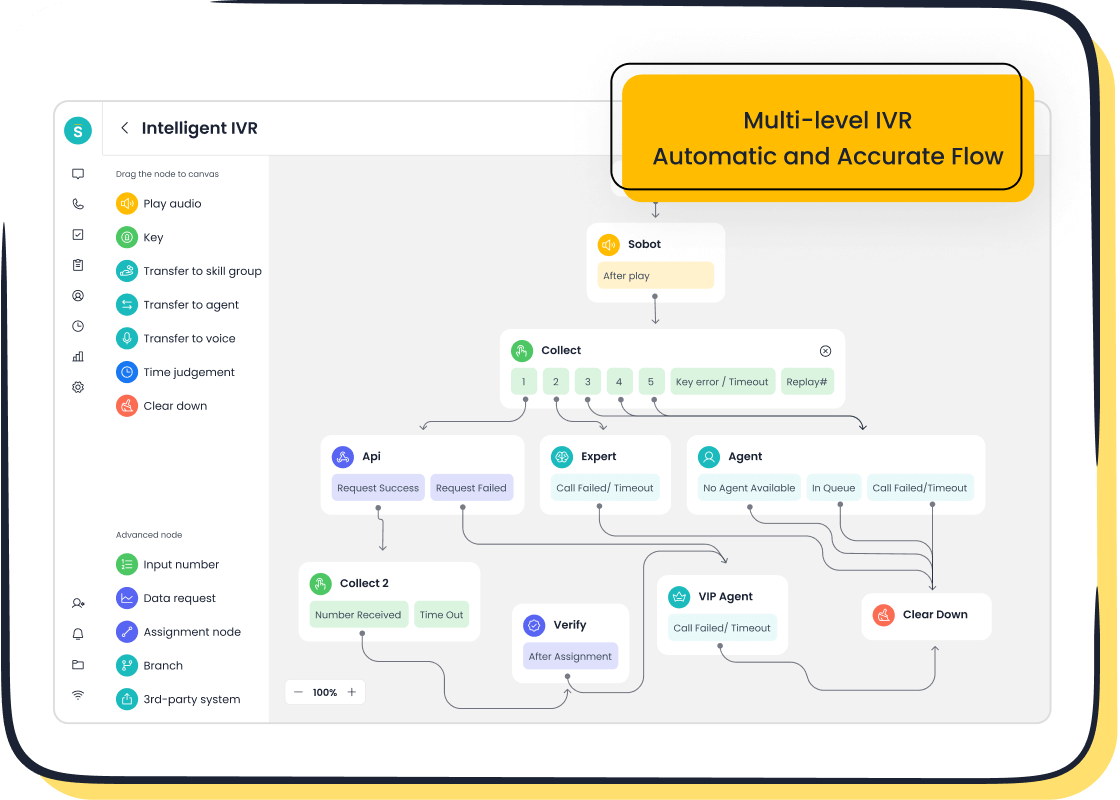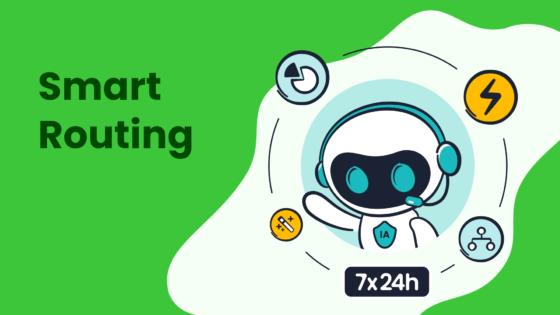Key Updates in Contact Center Quality for 2025

Contact center quality in 2025 will see major changes driven by generative AI, automation, and real-time analytics. Organizations must adapt to new customer expectations for faster, personalized service and expanded self-service options. Sobot leads innovation in this space with Sobot AI and Sobot call center solutions, empowering businesses to meet rising customer experience standards. Companies gain practical steps to boost operational success by embracing these advancements.
Contact Center Trends for 2025
The 2025 state of the contact center report highlights a rapid transformation in contact center technology. Organizations now focus on delivering seamless customer engagement, operational efficiency, and personalized experiences. Several major contact center trends shape the state of the contact center, including the rise of ai, automation, cloud-based contact center platforms, and predictive analytics. Sobot stands out as a leader in omnichannel and cloud-based solutions, helping businesses adapt to these changes and achieve a true omnichannel setup.
AI and Automation
Contact center technology in 2025 relies heavily on ai and automation. Companies use ai in the contact center to automate routine inquiries, reduce labor costs, and improve self-service through chatbots and intelligent IVR systems. Automation handles repetitive tasks, freeing agents to focus on complex issues. Ai-driven analytics and conversational ai provide real-time insights, helping managers monitor performance and intervene when needed. Agentic ai acts as a digital teammate, understanding context, making decisions, and resolving up to 80% of common customer service issues. These advancements transform the state of the contact center from reactive to proactive, scalable platforms.
Cloud Platforms
Cloud-based contact center adoption continues to accelerate. By 2025, 60% of contact centers are expected to use cloud-based solutions. This shift supports scalability, flexibility, and remote workforces. Cloud platforms enable real-time analytics, easy integration with CRM systems, and global reach. The market for cloud-based contact center technology is projected to grow rapidly, driven by the need for reliable, secure, and efficient operations. Sobot’s cloud-based solutions deliver high uptime and seamless integration, supporting businesses as they transition to modern platforms.
Predictive Analytics
Predictive analytics plays a key role in the state of the contact center. These tools forecast call volumes, optimize agent scheduling, and reduce wait times. Predictive call routing matches customers with the best agents, improving satisfaction. Conversation intelligence software analyzes interactions to predict satisfaction scores and churn risk. Ai-driven analytics enable proactive coaching and targeted improvements. Contact centers use predictive analytics to move from reactive management to anticipatory strategies, enhancing customer engagement and operational outcomes.
Enhancing Contact Center Quality with Sobot

Sobot continues to set new standards in contact center quality by combining advanced contact center technology with practical, user-friendly solutions. Businesses that use Sobot’s Voice/Call Center and omnichannel platforms see measurable improvements in service quality, operational efficiency, and customer satisfaction. The following sections highlight how Sobot’s real-time monitoring, automated quality assurance, and voice/call center solutions drive contact center excellence.
Real-Time Monitoring
Sobot’s real-time monitoring tools give supervisors and managers instant visibility into every customer interaction. These tools track agent adherence, monitor call quality, and provide actionable insights during live calls. Supervisors can use features like whisper and barge-in to guide agents discreetly, which helps reduce average handle times by up to 15%. Real-time monitoring also supports shift scheduling and agent coaching, leading to a 25% increase in agent performance scores.
Sobot’s AI-powered real-time monitoring transforms contact center technology by enabling proactive management. Supervisors can spot issues as they happen, address root causes, and prevent repeat calls. This approach reduces repeat calls by 50% and boosts agent productivity by up to 30%. Many call centers using Sobot’s tools report Net Promoter Scores (NPS) that are 15% higher than those without such technology.
Key benefits of Sobot’s real-time monitoring include:
- Improved agent adherence and engagement
- Faster call resolution and reduced handle times
- Higher customer satisfaction and loyalty
- Continuous agent feedback and performance improvement
Automated Quality Assurance
Automation plays a central role in Sobot’s approach to contact center quality. Sobot’s automated quality assurance tools use AI to review interactions, flag potential issues, and generate performance reports. This automation ensures that every call, chat, or message meets company standards without the need for manual review.
Sobot’s AI capabilities analyze conversations in real time, identifying trends and recommending coaching opportunities. Automated alerts notify supervisors about compliance risks or customer dissatisfaction, allowing for immediate intervention. This process not only saves time but also ensures consistent service quality across all channels.
- AI-driven coaching programs help agents improve their skills quickly.
- Automated issue detection addresses problems before they escalate.
- Quality assurance reports provide clear, actionable data for managers.
By automating quality checks, Sobot enables organizations to maintain high standards while reducing manual workload. This leads to better agent assistance, fewer errors, and a more reliable customer experience.
Voice/Call Center Solutions

Sobot’s voice and call center solutions stand out in the field of contact center technology. The platform features an AI-powered voicebot that handles both inbound and outbound calls with human-like accuracy. This voicebot can resolve customer issues independently, guide callers through menus, and even conduct batch outreach for marketing or support campaigns.
Sobot’s unified workspace brings together all customer interactions—voice, chat, email, and social media—into a single, easy-to-use dashboard. Agents can access customer histories, recommended answers, and real-time analytics, which helps them deliver faster, more personalized service.
Key features of Sobot’s voice/call center solutions include:
- AI-powered voicebots for efficient call handling and reduced manual labor
- Intelligent outbound calling for targeted batch campaigns
- Seamless integration with CRM and ERP systems for smooth data flow
- Scenario-based AI tailored for industries like retail and e-commerce
- Multi-language and timezone support for global coverage
- Personalized reception and knowledge-based recommendations
Sobot’s contact center technology delivers measurable results:
- Labor costs drop by 50% due to automation and AI in the contact center
- Agent efficiency increases by 200%, allowing teams to handle more interactions
- Sales improve by over 150% with AI-driven outbound marketing
- Over 50% of inbound calls are handled by AI-powered voicebots, freeing agents for complex tasks
Sobot’s omnichannel approach ensures that customers receive consistent, high-quality service no matter how they reach out. The platform’s AI-powered agent assistance tools, such as AI Copilot and AI Insight, help agents recognize intent, generate responses, and summarize conversations. These tools support agents in real time, improving both speed and accuracy.
Sobot’s commitment to contact center excellence is clear. The company’s solutions help organizations achieve higher service quality, better operational outcomes, and a superior customer experience. By leveraging advanced AI capabilities, automation, and a unified omnichannel platform, Sobot empowers businesses to lead in the evolving world of contact center quality.
Customer Experience and Personalization
Personalized Customer Experiences
Personalized customer experiences have become essential for contact centers in 2025. Companies now use customer data from CRM systems and past interactions to tailor conversations and offers. AI and machine learning predict customer needs and automate responses, allowing chatbots to handle routine inquiries and agents to focus on complex issues. Sobot’s platform integrates these technologies, enabling agents to reference customer names, previous purchases, and preferences. This approach creates 1:1 customer service, making each interaction feel unique and relevant. Sobot’s machine learning-based suggestion engine recommends responses based on historical data, helping agents build rapport and recognize personalization opportunities. These strategies drive customer satisfaction, loyalty, and retention by meeting customer demands for efficient and emotionally engaging service.
Omnichannel Engagement
Omnichannel customer support is a key driver of customer experience optimization. Sobot’s true omnichannel setup unifies communication channels, including web chat, mobile apps, social media, and voice. Customers can switch channels without repeating information, preserving context and continuity. Agents access complete interaction histories, enabling them to deliver relevant and efficient support. Sobot’s intelligent routing directs inquiries to the right agent, reducing frustrating handoffs and improving resolution times. Self-service options, such as AI-powered chatbots and IVR, empower customers to resolve simple issues independently. Brands like OPPO and MICHAEL KORS have leveraged Sobot’s omnichannel strategy to achieve higher customer engagement and satisfaction, as seen in measurable outcomes like a 25% increase in sales and a 30% reduction in complaints.
Data-Driven Insights
Data-driven insights transform customer experience and operational efficiency in contact centers. Sobot’s analytics platform uses AI-enhanced contact analytics to identify issues, provide automated suggestions, and create feedback loops. Real-time insights enable instant alerts, continuous KPI tracking, and quick identification of knowledge gaps. Agents receive guidance during calls, improving response speed and accuracy. Sobot’s integration with CRM systems and business tools supports tailored dashboards and action protocols. These practices help companies anticipate customer expectations, streamline workflows, and foster team collaboration. By analyzing customer feedback and sentiment, Sobot enables continuous improvement, turning contact centers into strategic assets that deliver superior customer experience.
State of the Contact Center: Compliance and Security

Contact centers face new challenges in compliance and security as regulations and threats evolve. The 2025 state of the contact center report shows a shift from manual compliance checklists to proactive, AI-powered management systems. These systems unify data across channels, detect risks in real time, and help organizations act quickly to reduce risk and improve performance. Sobot’s secure, encrypted data transfer and global compliance features support businesses in meeting these demands.
Regulatory Standards
Regulatory standards have become stricter in the state of the contact center. Laws such as GDPR and CCPA require stronger consumer rights, frequent audits, and careful cross-border data transfers. AI-specific regulations now focus on transparency, explainability, and bias prevention. Cybersecurity rules demand advanced measures like multi-factor authentication and encryption. Contact centers must keep records longer and follow strict security standards. Sobot’s solutions offer encrypted data transfer and secure storage, helping companies meet these requirements. Healthcare and financial services need secure messaging and integration with regulatory databases. Sobot’s platform supports these needs with compliance certifications and audit capabilities.
Organizations benefit from Sobot’s global compliance support, which ensures consistent privacy and security across all channels. This approach aligns with the state of the contact center, where omnichannel compliance and consumer protection laws require fairness and transparency.
Data Privacy
Data privacy remains a top priority in the state of the contact center. Contact centers use multi-factor and biometric authentication, including facial recognition and behavioral voice analysis, to verify identities. AI-powered anomaly detection systems spot unusual patterns that human agents might miss. Security-focused training helps agents detect social engineering and deepfake threats. Sobot integrates workflows and systems to eliminate gaps caused by fragmented data. Real-world simulations test defenses against fraud and impersonation. Sobot partners with cybersecurity vendors to stay ahead of new threats and compliance changes.
- Next-generation authentication methods protect customer data.
- AI systems detect and respond to privacy risks instantly.
- Integrated platforms reduce vulnerabilities and improve data security.
Voice Biometrics
Voice biometrics play a key role in the state of the contact center. This technology uses unique vocal traits to verify identity, replacing passwords and security questions. Voice biometrics support both active and passive authentication, allowing seamless verification during natural conversation. Sobot’s voice solutions integrate with IVR and CRM systems for real-time fraud detection and alerts. Advanced features like anti-spoofing and liveness detection protect voiceprints and ensure compliance with laws such as GDPR and HIPAA.
- Voice biometrics reduce average handle time and operational costs.
- Automated authentication improves customer satisfaction and trust.
- The system detects spoofing attempts and synthetic voices, preventing fraud.
Sobot’s encrypted data transfer, secure storage, and role-based access controls help organizations meet global compliance standards. The state of the contact center now relies on layered security, combining encryption, biometrics, and AI to protect sensitive information and maintain customer trust.
Agent Experience and Performance
Training and Upskilling
Agent roles in contact centers have changed with the rise of AI and automation. Today, agents focus on complex, emotionally nuanced interactions that require empathy, critical thinking, and strong problem-solving skills. Effective training programs now emphasize collaboration between humans and AI, advanced communication, and technology proficiency. Many organizations use immersive learning methods, such as scenario-based exercises, peer mentorship, and continuous microlearning. These approaches help agents adapt quickly to new contact center technology.
Modern training platforms often include AI-powered learning analytics and real-time coaching. These tools identify skill gaps and provide targeted feedback. Ongoing education, regular skill assessments, and cross-training ensure agents stay current as AI evolves. Stress management and emotional support programs also play a key role in supporting agent well-being during transitions.
Sobot’s unified workspace makes onboarding easier by offering a clean, intuitive interface. Agents can manage conversations across channels without switching platforms, which reduces training time and boosts confidence.
Human-AI Collaboration
Human-AI collaboration has become central to agent experience and performance. AI handles routine tasks, such as summarizing calls and translating languages, while agents focus on empathy and cultural understanding. This partnership improves both efficiency and customer satisfaction.
| Aspect | Benefit |
|---|---|
| Reduction of admin burden | AI reduces after-call work by 20%, freeing agents for complex issues |
| Quality assurance | AI monitors all calls in real time, enabling faster, more consistent feedback |
| Faster onboarding | AI-powered analytics tailor coaching and speed up agent readiness |
| Customer satisfaction | Human-led support can increase Net Promoter Score by 72 points |
| Cost savings | AI-driven automation can reduce labor costs and boost efficiency by 30% |
Sobot’s real-time monitoring and AI-powered bots support agents by suggesting next-best actions and surfacing relevant information. This reduces administrative load and allows agents to deliver more personalized service.
Performance Metrics
Contact center technology now uses a range of metrics to measure agent success. Key indicators include Customer Satisfaction (CSAT), Net Promoter Score (NPS), First Call Resolution (FCR), and Customer Effort Score (CES). These metrics reflect both the quality of agent-customer interactions and operational efficiency.
- CSAT surveys measure how satisfied customers feel after each interaction.
- NPS tracks customer loyalty and their likelihood to recommend the company.
- FCR shows how often agents resolve issues on the first contact.
- CES measures how easy it is for customers to get help.
Sobot’s unified workspace and analytics tools help managers track these metrics in real time. This enables targeted coaching, workload balancing, and continuous improvement, ensuring a positive agent experience and high performance.
Contact center quality in 2025 relies on innovation, compliance, and a strong focus on customer experience. Companies that use advanced AI, automation, and analytics see higher customer satisfaction, faster response times, and improved revenue. Modern solutions like Sobot help organizations scale operations, reduce costs, and boost agent productivity. These contact center trends drive better customer relationships and support long-term revenue growth. Organizations that invest in technology and customer-centric strategies stay ahead in a fast-changing market.
FAQ
What makes Sobot’s contact center solutions unique?
Sobot offers an all-in-one platform with AI-powered voicebots, real-time analytics, and omnichannel support. The system helps businesses improve customer satisfaction and agent productivity. Sobot’s solutions also support global operations and provide secure, encrypted data transfer.
How does Sobot help revenue-focused contact centers?
Sobot’s automation tools reduce manual work and speed up response times. The platform’s analytics identify sales opportunities and track performance. These features help revenue-focused contact centers increase efficiency and drive business growth.
Can Sobot integrate with existing business systems?
Yes. Sobot integrates easily with CRM, ERP, and other business tools. This seamless connection allows agents to access customer data and manage interactions from one unified workspace.
How does Sobot ensure data security and compliance?
Sobot uses encrypted data transfer, secure storage, and role-based access controls. The platform meets global compliance standards, including GDPR and CCPA. Regular audits and advanced authentication methods protect sensitive customer information.
What industries benefit most from Sobot’s solutions?
Sobot serves retail, finance, gaming, education, and enterprise services. Companies in these industries use Sobot to unify customer contact, improve service quality, and support revenue-focused contact centers.
